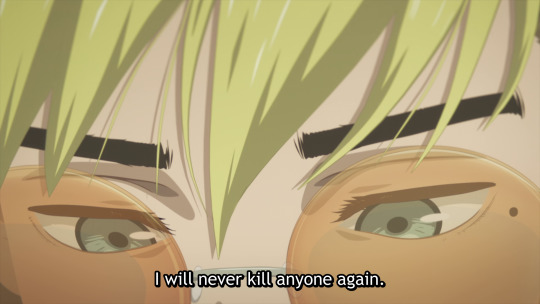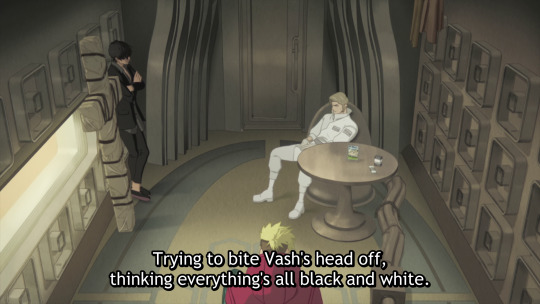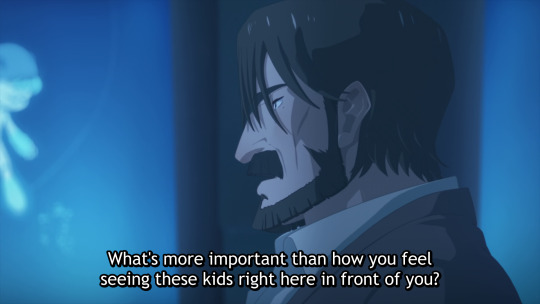#he only ever calls him wolfwood in canon (and in trimax at least he's the only one who does) and that's like. on purpose.
Text
day 4759387 of getting jumpscared by vash calling wolfwood "nicholas" in vw fics
#he only ever calls him wolfwood in canon (and in trimax at least he's the only one who does) and that's like. on purpose.#it's always distracting when i see it in fics bc the only ppl who call him nicholas are ppl from the eom or the orphanage#feels very very deliberate how names are used in trigun#stamp even has that whole scene where vash tenderly calls him wolfwood and 'nicholas the punisher' is a defensive tsundere flinch#not tagging this but if it shows up anyway uh. hi. i have opinions. many.
11 notes
·
View notes
Text
I’ll never kill. Ever again.
OK, so I didn't catch the significance at first, but after having absorbed the other Trigun canons, it really stands out to me. From "Millions Knives":

In the English dub, Vash's words are similar: "I’ll never kill. Ever again."
Correct me if I'm wrong, but in the manga and 1998 canons, Legato is in fact the first person that Vash ever actually kills.
Though arguably he does hurt people very badly in the manga, his pacifism is generally about doing the least possible amount of harm to resolve a situation.
So when Stampede Vash says he HAS killed in the past, what is he referring to? Is it his guilt over The Big Fall? Nai did a number on him by retroactively making Vash feel as though the blood of that is on his hands, by showing Nai the access code to the SEEDS05 computer. Or is there something else that happened that we haven't seen yet, something where Vash ended up actually killing someone himself?
I think either way there's a difference between the Vashes here. 98 Vash is the most pure in his pacifism. He even goes out of his way to avoid harming anyone at all, if he can. He seems almost paralyzed by it at times, it even makes him freeze up in situations where he is faced with the choice to kill. 98 ends with him rejecting his obsession with Rem in order to stop Knives.
Manga Vash is frankly not afraid to draw blood, though he avoids it if he can. He has a lot more anger and escalates his willingness to harm with the danger of the situation. His refusal to kill is very tied up to his refusal of his own suicide and Rem's blank ticket speech. After Tesla, he chose to live because of Rem's love. Rem's love also saved the humans of NML. There's a whole transference here with him, where he needs to save the humans as part of him continuing to save himself from that suicidal urge that hasn't really gone away in all that time. And when he does finally give in to that suicidal urge at the end of Trimax, he does it with the mental context of giving his tomorrows to humanity just like Rem did. He embraces Rem’s path even more.
Stampede Vash though-- There's still a lot we don't know about what happened after Tesla. We know Rem gave the blank ticket speech. In the more limited examples we have, Vash absolutely minimizes harm to others, largely by drawing fire and running from it, and minimizes harm to himself. He is extremely controlled and precise in his use of force, again escalating only as much as absolutely necessary. He is actively trying to defuse situations and bring people together. The only times we really see Vash threaten anyone are his confrontations with Knives, and there's no sense that his heart is in actually harming Knives at all.
So is his pacifism a mixture of guilt over the Big Fall, and a need to carry on Rem's work and keep the humans and plants of NML alive just a little longer? Is that really about pacifism at all? If he did try to kill himself after Tesla, which is likely, how much is that driving him here? He is carrying a lot of pain, guilt, and shame, given his regular self-punishment.
And then there's this, in the same scene:

Brad tells Wolfwood that Vash's desire to save everyone on NML including Knives, is actually right.
This is absolutely fascinating to me. In 98, Brad is deeply antagonistic to Vash, partly out of jealousy over Jessica, but also because Vash goes out into NML and fights while Brad and the others in the Flying City hide in fear of "outsiders." Brad is a narrative critique of Vash's violence, and in the end he switches over and defends Vash, dying to save him.
In the manga, Brad is deeply antagonistic to Vash again out of jealousy over Jessica, but also he explicitly calls Vash a monster for his part in July and the Fifth Moon. Again, Brad serves as a critique of Vash, this time about the extreme destruction he's capable of. This is similar to Wolfwood's post-Dragon's Nest moment of doubt, where he seriously considered killing Vash to prevent Knives from using Vash's power ever again.
Stampede Brad is a narrative voice again, first antagonistic as his other counterparts, suspicious of Vash's very nature. But quickly enough he comes around and ends up as one of Vash's parental figures. And when Wolfwood doubts Vash for wanting to save everyone, Brad defends Vash. He says Vash is strong enough to find a way to make his dream happen. In contrast to so many others, instead of telling Vash to take a side, Brad says everything isn't black and white. And in fact SEEDS03 is actively working on a solution that will help Vash's dream happen, by trying to terraform NML with flora.
I think more than anything, Stampede Vash is defined by hope. He has people already trying to make a better NML. He goes out into the world and helps people and stops violence in order to keep plants and humans alive long enough for Luida's terraforming plan to succeed.

Roberto is another narrative voice. In "Humans", when Conrad shows off his work, all in the name of remaking the human race for survival without plants, Roberto calls him out, saying that his dream is not worth the cost of his monstrous abuse of innocents. Knives and Conrad's "dream" is one of humans and plants living completely separately, without depending on each other.
All of which is to say, in 98 the core inner conflict was Vash's fixation with Rem, and his refusal to kill reflected that. In the manga, the core inner conflict was the transference of Vash's denial of suicide, and his refusal to kill reflected that.
Stampede's core inner conflict so far appears to be abuse and isolation vs love and connection. The struggle of finding a way to survive while minimizing harm to others. This changes Vash's refusal to kill yet again. And all the more fascinating if Vash has already broken that ideal, if it's not a psychological block or obsession like 98 and the manga, but the choice he makes from lived experience and regret. Vash as a kind person having suffered greatly to learn his kindness.
All of which has massive ramifications for story elements that are entirely focused on Vash's refusal to kill. Such as Wolfwood. Perhaps that's part of why Wolfwood's story arc from the manga has already been largely completely by "High Noon at July". Wolfwood might still have no obvious compunction against killing, but Vash has already started to open up his heart. Wolfwood killed Rollo because he had no hope for Rollo or himself. And then Vash gave him hope for Livio, which is far more important to Stampede Wolfwood than what level of violence he should use. Even Livio shooting himself didn't take that away. Despite the destruction of JuLai, Wolfwood ends Stampede S1 with hope, for Livio and maybe even himself.
And also such as Legato. Perhaps that's why Legato's 98/manga obsession with Vash has been refocused towards Wolfwood in "Once Upon A Time In Hopeland/WOLFWOOD". Though I could certainly see Legato plotting a Death Game in revenge for "High Noon at July". Wolfwood is a safe target for Legato to transfer his anger at Knives. The big brother who needs to have his little brother taken away from him for his own good, to purify him.
Fascinating that Legato actually feels anger at Knives here, vs manga Legato who seems to be willing to accept any denigration with the eternal hope that Knives will show him a tiny speck of approval one day. Manga Legato wanted to destroy Vash as a gift for Knives, as proof of Legato's faith. Stampede Legato wants to punish Wolfwood because he can't punish Knives.
#trigun meta#trigun#trigun stampede#trigun maximum#trigun 1998#vash the stampede#nicholas d. wolfwood#legato bluesummers#trigun brad
201 notes
·
View notes